“Plato’s Stepchildren”
Written by Meyer Dolinsky
Directed by David Alexander
Season 3, Episode 12
Production episode 60043-67
Original air date: November 22, 1968
Stardate: 5784.2
Captain’s log. The Enterprise responds to a distress call from an uncharted planet, one on which Spock’s sensors detect no life. They are greeted by a very short humanoid named Alexander, who provides a massive infodump about how they are the Platonians, and they travelled to Earth during the height of Greek civilization after their own sun went nova, and then colonized this world after Greece fell. They apparently follow Plato’s teachings, and Parmen, their current philosopher-king, calls them Plato’s children, though Alexander thinks it would be more accurate to call them Plato’s stepchildren.
That would make a dandy title…
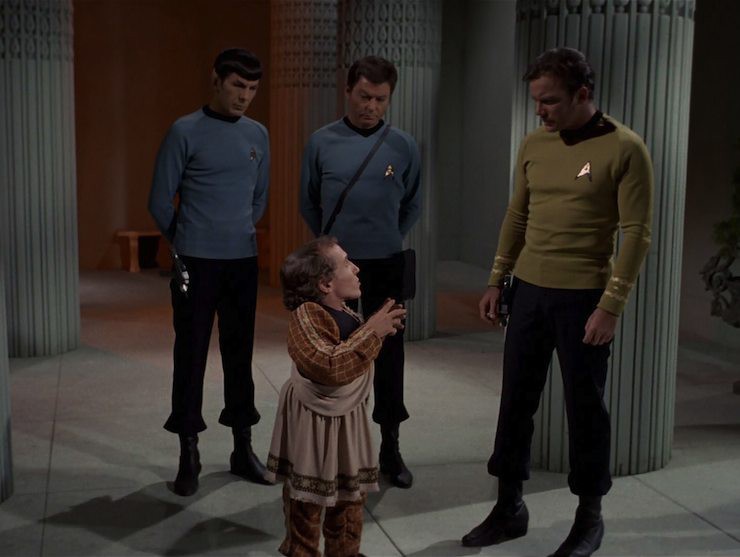
The distress call was for Parmen, whose leg is horribly infected after he scratched it. McCoy treats him, though he’s shocked when Parmen telekinetically wields McCoy’s hypo. Parmen’s wife, Philana, explains that there are only 38 of them, and they’re immortal. However, because they never get sick, their resistance is low, so a simple scratch could be fatal.
However, Parmen’s infection makes him delirious and in his fever, his telekinetic powers go binky bonkers, affecting not only the landing party and the furniture in the room, but also the Enterprise in orbit. After a great deal of effort, which gets McCoy thrown into a wall and Alexander almost strangling himself, he’s sedated and everything calms down.
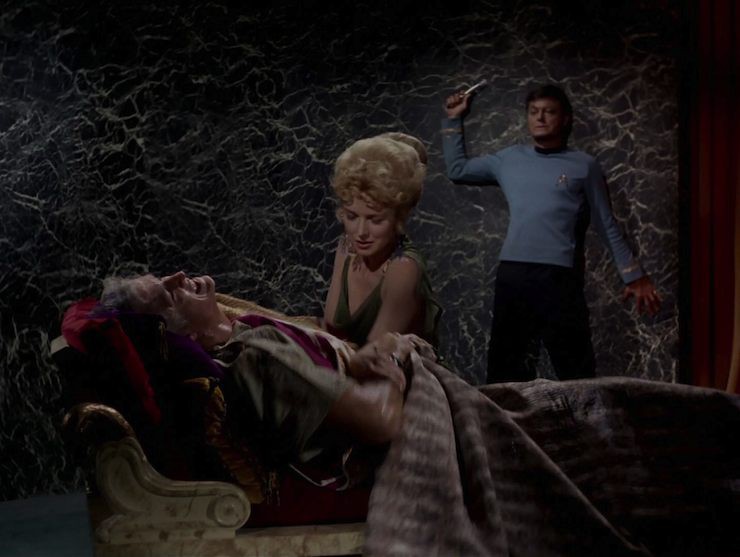
Kirk wants to go back to the ship, but McCoy wants to stay with his patient until the fever breaks. Alexander leads Kirk and Spock to a guest suite. He explains that he’s the only one who has no telekinetic abilities—he’s a throwback—and is stunned to learn that Kirk and Spock come from a place where nobody cares what size, shape, or color you are.
McCoy reports the fever has broken and the infection is almost drained. Kirk wants to beam back, but Scotty reports that all the ship’s instrumentation is frozen and they’re locked in orbit. (Why Scotty waited until Kirk actually called him to report this rather major issue with the ship is left as an exercise for the viewer.) Kirk goes to Parmen to ask him to free the ship and let them leave, but Parmen doesn’t like Kirk’s attitude and so steals his phaser and makes Kirk slap himself over and over and over again.

After that, Kirk goes back to the suite. Communication with the Enterprise is completely cut off, and Spock is quite sure that the Platonians have no intention of letting them go. Parmen and Philana then force the landing party to walk to the throne room, where they are presented with gifts in gratitude for saving Parmen’s life: the shield of Pericles for Kirk, a lyre for Spock, and a scroll belonging to Hippocrates for McCoy. Parmen then asks forgiveness for his earlier behavior, and promises to release the Enterprise soon. However, he requests that McCoy remain behind to be their physician.
McCoy refuses. Parmen insists and can back it up with his telekinesis. Kirk and Spock are released, but they won’t leave without the doctor.
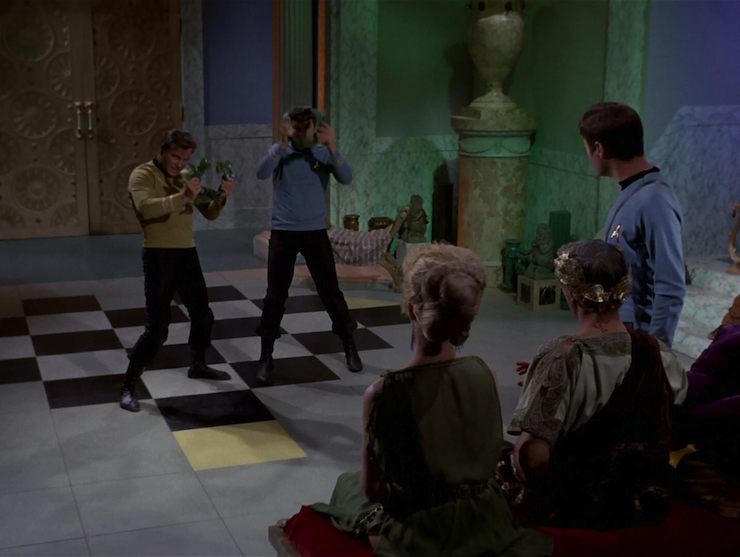
So Parmen decides to torment them. He forces McCoy to watch while Kirk and Spock put on laurel leaves and are forced to perform: dancing, singing, play-acting, quoting bad poetry, crawling, rolling on the floor, and generally making total fools of themselves.
Between bits of foolishness, Kirk orders McCoy not to give in no matter what, and when Parmen asks McCoy if he’ll reconsider, McCoy simply says, “I have my orders.”
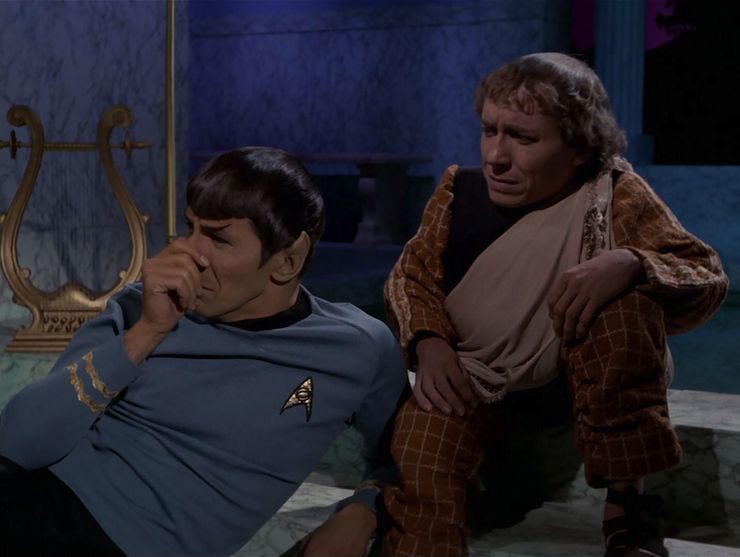
So Parmen continues, making Spock do a flamenco dance around Kirk’s prone form, then making him first laugh, then cry.
Alexander pleads on their behalf, saying he’s ashamed to be a Platonian. So they get him in on the act, making Kirk go on all fours and whinny like a horse while Alexander rides him. I SWEAR I AM NOT MAKING THIS UP, KIRK WHINNIES LIKE A HORSE OVER AND OVER AGAIN WHILE SOMEBODY RIDES HIM!
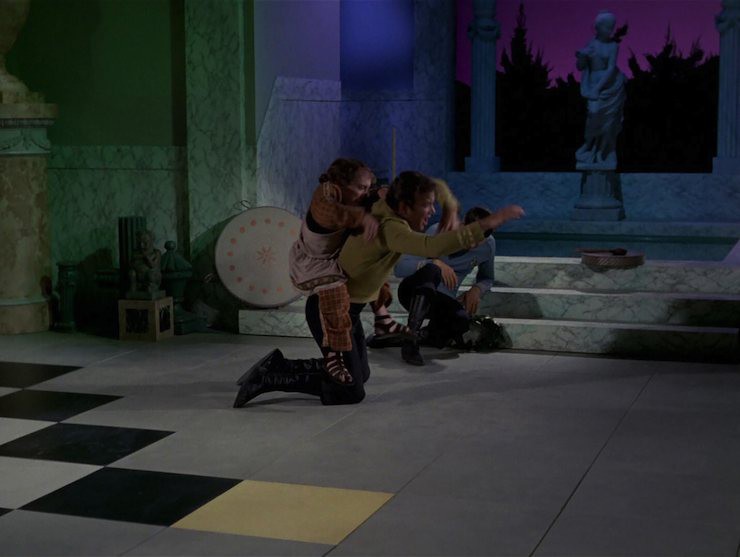
Eventually, Parmen and Philana get bored and send the landing party and Alexander back to the suite. Spock is withdrawn from the trauma of being forced to be emotional, making it harder to maintain his usual control. (At one point, he crushes a gold chalice.) McCoy considers giving in, but Kirk won’t let him.
Alexander is impressed with their resolve. The Platonians are treating the landing party the same way they treat Alexander, but they fight back. And now Alexander realizes that it’s not him, it’s them. He breaks a vase, and threatens to scratch them so they get infected and die, but Kirk won’t let him throw his life away. Alexander is touched—no one’s ever put his life ahead of their own before.
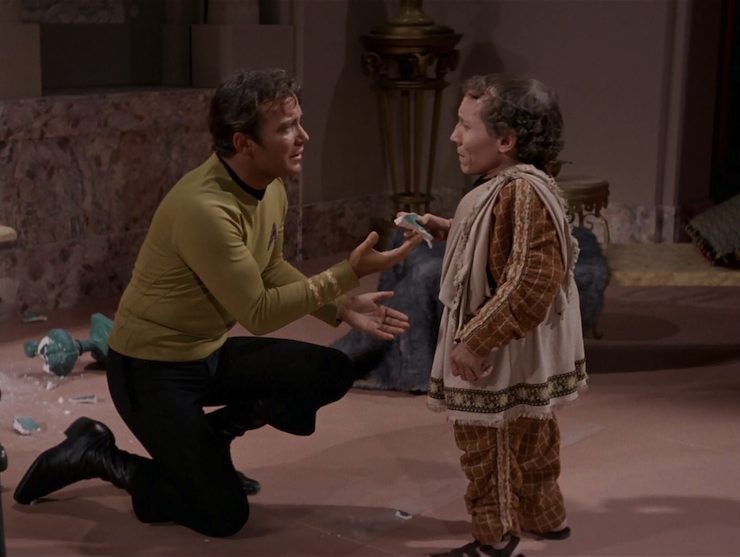
Alexander also reveals that the Platonians didn’t develop their mental powers until after they started eating the native food. McCoy scans Alexander and then compares that scan to the data he took of Parmen. It turns out that they both have kironide in their system—a native element that’s a powerful energy source—but in Parmen it’s interacted with his pituitary gland to grant him the telekinesis. But Alexander’s pituitary gland is stunted, so he doesn’t have the powers everyone else does.
Now the Platonians’ keeping the place secret makes sense: anyone who eats the food can gain the telekinetic powers.
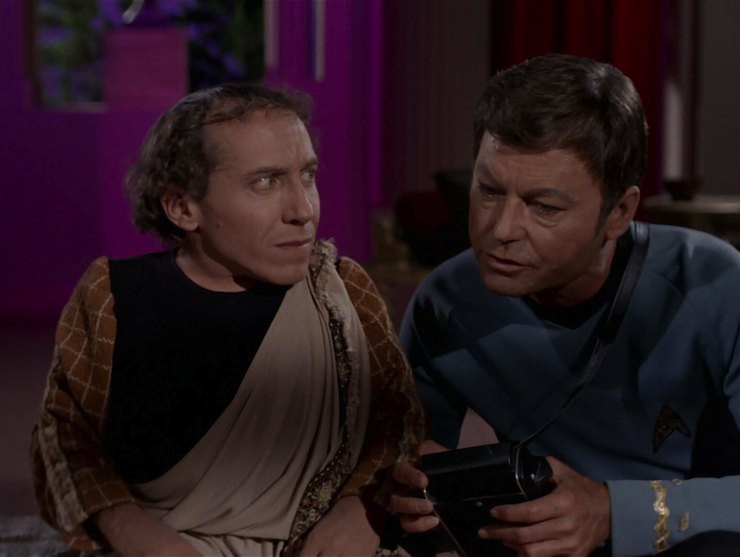
McCoy synthesizes a kironide injection for all of them. (Yes, McCoy can put together a hypo that gives humans super powers with what he has in his medikit.) He injects himself, Kirk, and Spock, but Alexander refuses—he has no desire to become like the other Platonians. Spock is concerned that it will take a while for the kironide to take effect.
They’re interrupted by the transporter: Uhura and Chapel materialize, but they are unable to talk (though they are obviously trying to) and then they are forced out of the room. Kirk grumbles that apparently the three of them alone aren’t entertaining enough.
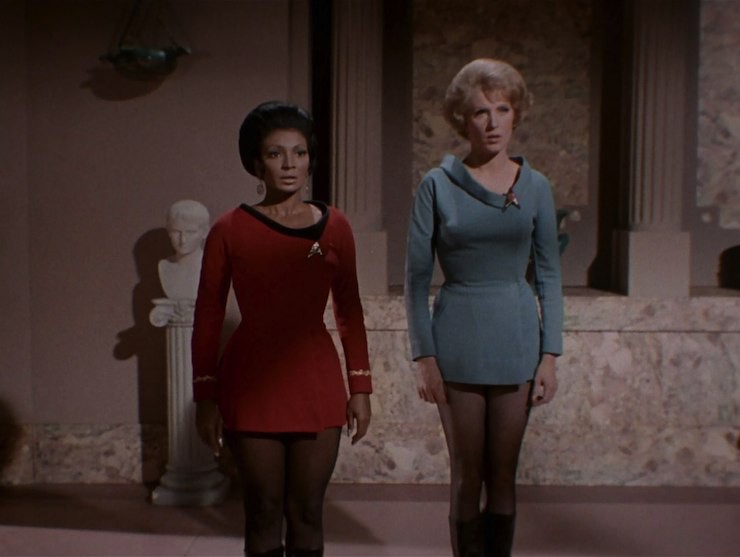
The Platonians then force Kirk, Spock, Uhura, and Chapel to change into Greek clothing similar to those of the Platonians. They are made to perform for the entire population of Platonius (and also McCoy, who’s sitting with Alexander in the audience).
Spock is forced to sing a really mediocre song to Uhura and Chapel, then the women are forced to lay down while Kirk and Spock run back and forth between them. Eventually they settle on Spock with Chapel and Kirk with Uhura. Chapel gets her lifelong wish to kiss Spock, while Kirk and Uhura are also forced to lock lips. Chapel is disgusted that this is how that has happened.
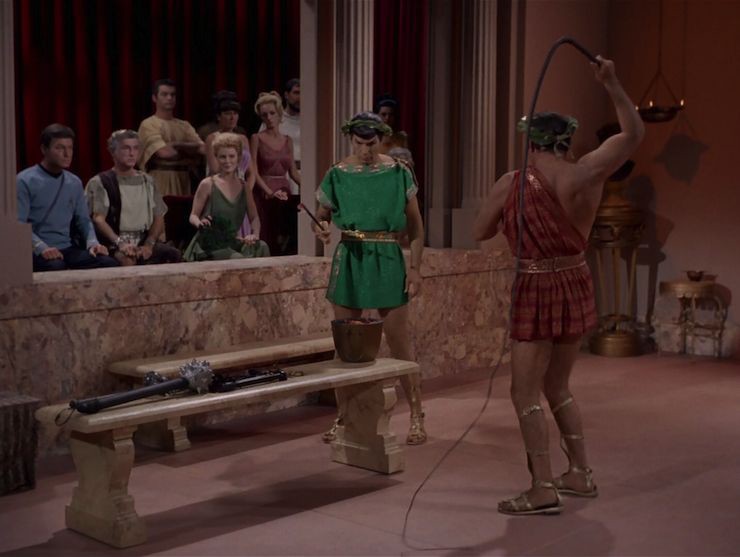
Kirk and Spock are then forced over to a bench filled with weapons. Kirk picks up a bullwhip while Spock grabs a hot poker. Even as Kirk cracks his whip (probably not a euphemism), Alexander takes advantage of everyone’s distraction to grab a knife and try to kill Parmen—but Philana stops him. However, before Parmen can make Alexander kill himself, Kirk’s and Spock’s fancy-shmancy kironide powers kick in, and they toss aside their weapons and keep Parmen from controlling Alexander.
However, when Alexander tries to kill Parmen, Kirk stops him, urging him not to become like Parmen. For his part, Parmen is humbled by Kirk sparing his life when he knew that Parmen had every intention of killing him and his crew in the end.
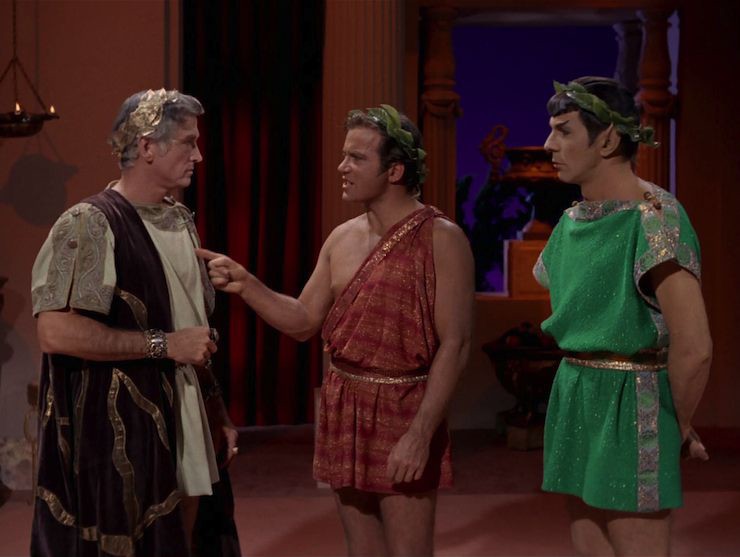
Parmen tries to apologize, but Kirk and Spock don’t buy it for a second. They agree to stay hidden, and Kirk reminds them that they can re-create their powers at a moment’s notice. Parmen agrees, and the landing party beam back alongside Alexander. When he contacts the Enterprise, Kirk tells Scotty that he has “a little surprise for you” while kneeling down next to Alexander, which apparently somebody thought was funny.
Fascinating. McCoy says that forcing Spock to be emotional is damaging to him, which is sorta true? Kinda? But not really?
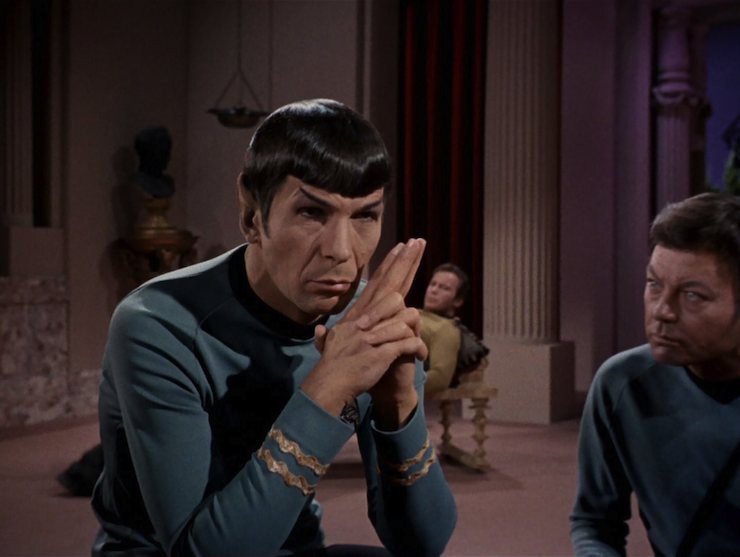
I’m a doctor not an escalator. McCoy is unwilling to be the Platonians’ physician, though after watching his two best friends act like total bloody idiots for twenty minutes, he finally gives in and agrees to do whatever Parmen wants as long as he stops torturing his crewmates.
Hailing frequencies open. Uhura confesses that she’s always looked to Kirk for strength when she’s been afraid in the past, right before she sucks face with the captain.
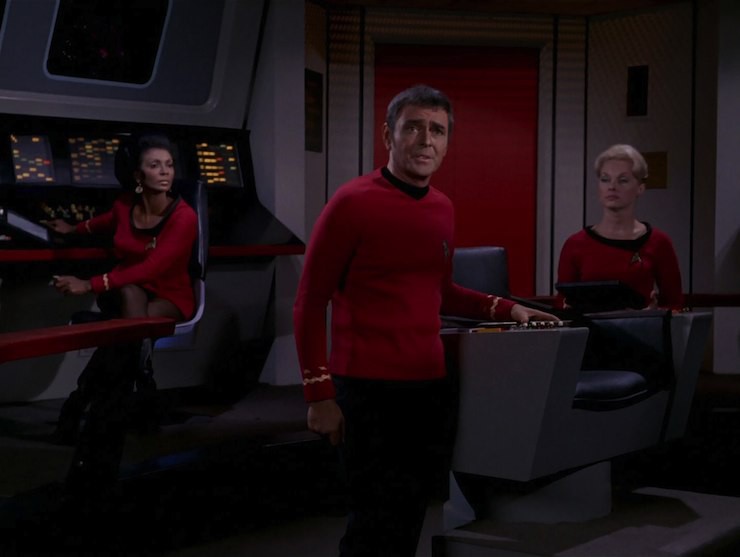
I cannot change the laws of physics! Scotty gets to whine a lot about how the Platonians have messed up the ship.
No sex, please, we’re Starfleet. Kirk gets put in a himation that exposes a quarter of his manly manly chest, while Chapel and Uhura are put in elegant gowns, the former’s being quite revealing (as is Philana’s). Spock’s himation covers his chest, but his legs look good…
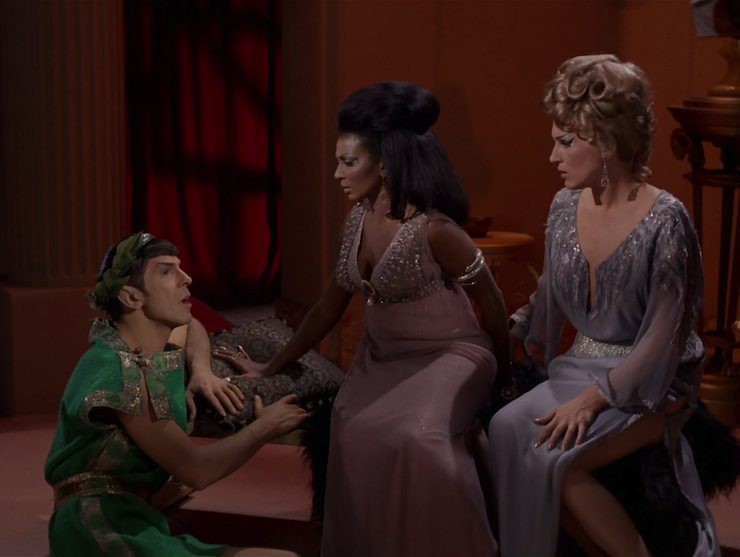
Channel open. “To us, killing is murder. Even for revenge.”
Kirk, lying through his teeth and not making sense. (Revenge makes it more like murder, not less.)
Welcome aboard. Barbara Babcock returns to the front of the camera as Philana for the first time since playing Mea 3 in “A Taste of Armageddon.” She’s also done voiceover work in “The Squire of Gothos,” “Assignment: Earth,” and “The Tholian Web,” and will do so again in “The Lights of Zetar.”
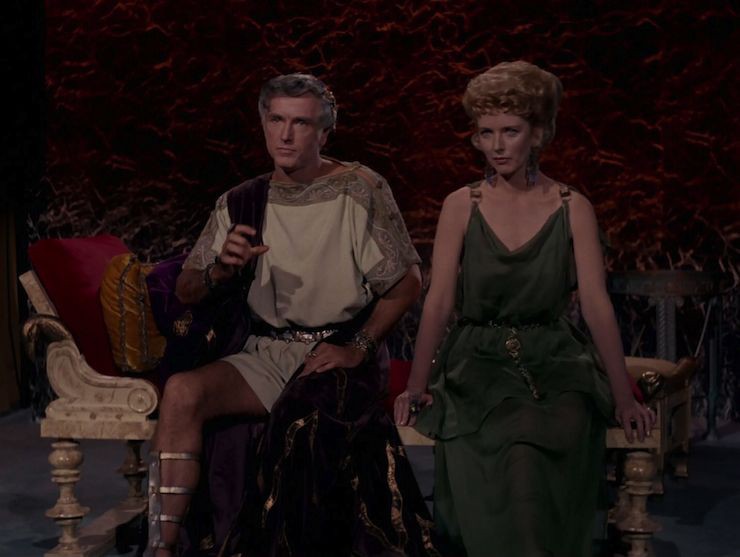
Michael Dunn plays Alexander. He was a finalist for the role of Balok in “The Corbomite Maneuver,” but lost out to Clint Howard.
Liam Sullivan, Ted Scott, and Derek Partridge play other Platonians, while we get recurring regulars Nichelle Nichols, James Doohan, and Majel Barrett.
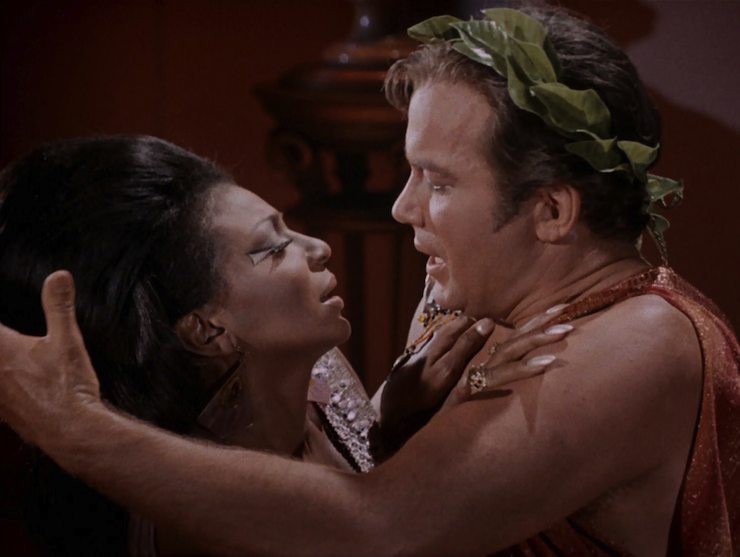
Trivial matters: This episode is best known as having TV’s first kiss between fictional characters where one is white and the other is black, making it very controversial for 1968. According to Nichelle Nichols, the plan was originally to film two versions of the scene, one with the kiss and one without, the latter to be used to air in Southern states, but Nichols and William Shatner conspired to sabotage the non-kiss version so it’d be unusable. Eventually, the crew gave up and they just went with the kiss.
This episode was not shown in the UK until the 1990s, but not because of the interracial kiss, but rather because of the elements of torture. The BBC refused to show “Miri,” “Whom Gods Destroy,” and “The Empath” for similar reasons.
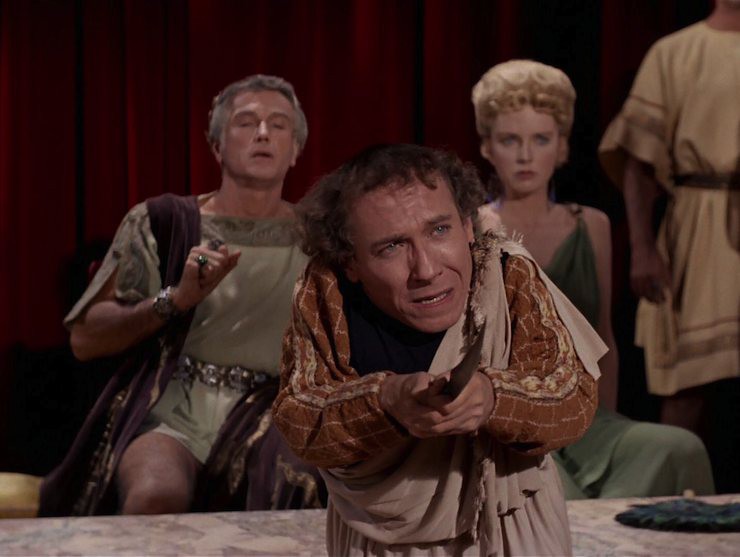
Surprisingly, Leonard Nimoy himself wrote “Maiden Wine,” the song Spock sings to Uhura and Chapel. (More surprisingly, Nimoy actually admitted publicly to writing that song.) A full version was recorded for the 1969 album The Touch of Leonard Nimoy. (Your humble rewatcher will now pause to restrain himself from making a “bad touch” joke.)
This is the only script for the show by veteran TV writer Meyer Dolinsky, who was one of the many working TV writers Gene Roddenberry courted in the early days of the show. It’s almost hard to believe he was never asked to write another.
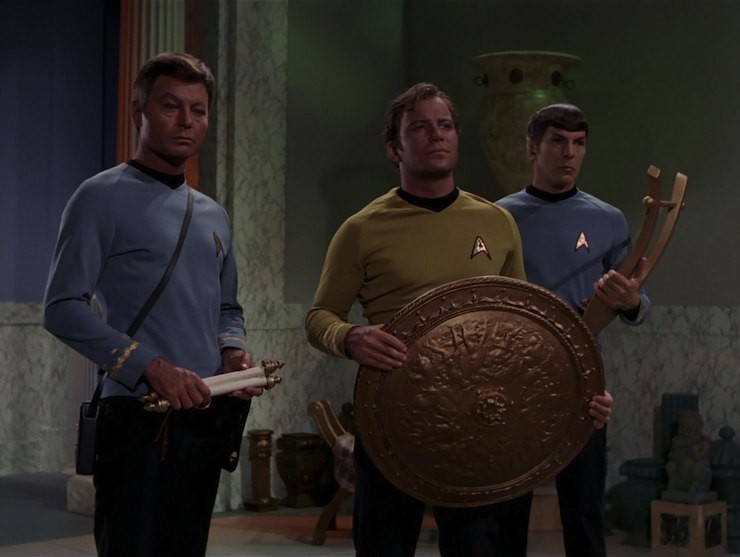
To boldly go. “Bitter dregs…” HOLY CRAP, WHY DOES ANYONE THINK “SPOCK’S BRAIN” IS THE WORST EPISODE WHEN THIS EMBARRASSMENT EXISTS??????
I mean, yeah, okay, interracial kiss, blah blah blah, but even that’s a tempest in a teapot. They’re not kissing because they want to, they’re kissing because the Platonians are assholes who want to torment them. Kirk doesn’t even keep his eyes closed during the kiss. It’s just the latest in a series of humiliations, and it’s just stupid. The Chapel-Spock kiss is more effective from a story perspective anyhow, since Chapel really has wanted to be intimate with Spock since all the way back in “The Naked Time,” and this is so totally not the way she wanted it to happen.
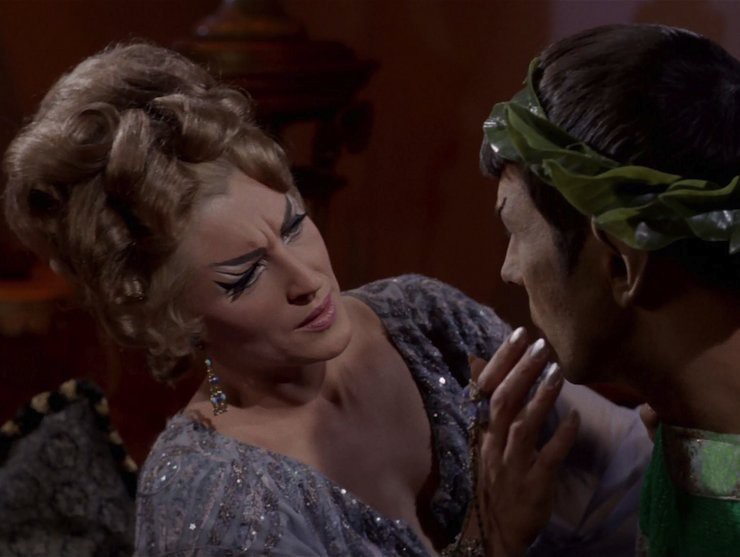
Anyhow, is there anything redemptive about this episode? I guess. I mean, Michael Dunn’s Alexander is actually a character of great dignity, especially given his most undignified place in Platonian society, and he actually undergoes an impressive character growth, as he learns how to fight back. He makes several speeches, and Dunn delivers them in a refreshingly easygoing manner that makes them far more emotional than histrionics would have conveyed.
It’s also nice that the landing party makes no kind of fuss over his shortness—at least until the tacky “little surprise” line at the end, which manages to undo most of that tolerance for the sake of a cheap and meager laugh.
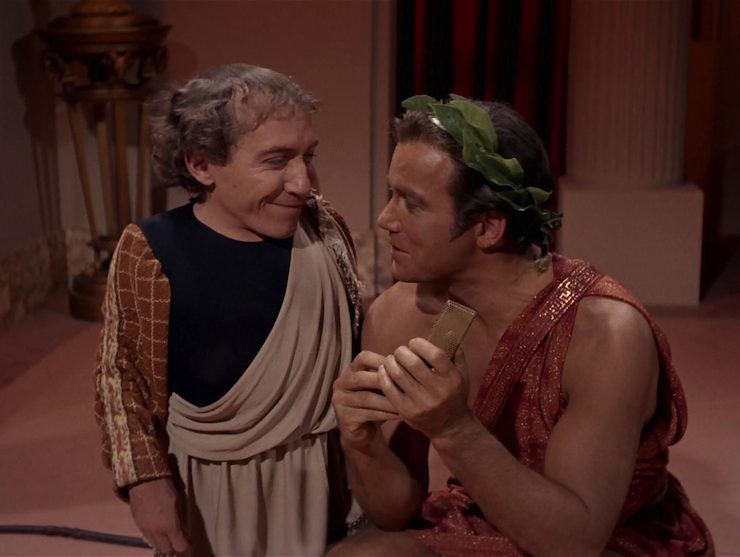
What else? Barbara Babcock is always magnificent, but her part is pretty poor and doesn’t make good use of her talents, as she mostly just delivers exposition and gives sultry stares during the torture scenes.
But ultimately none of it matters, because HOLY CRAP, THIS EPISODE IS HORRIBLE. The dialogue is awkward and clunky, with sentences not following from one to the other. Everyone talks in infodumps, from Alexander in the beginning to Parmen in the end, and it’s all leaden. Liam Sullivan’s Parmen has no bite to him as a villain whatsoever.
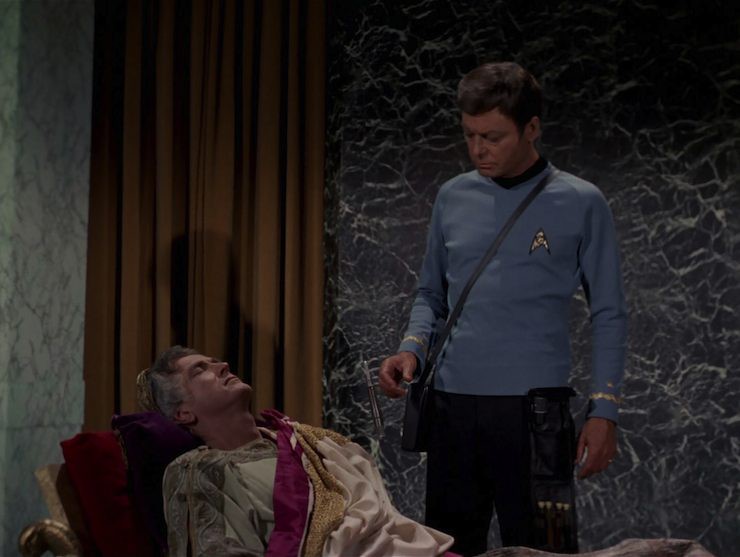
And then there’s the entire middle part of the episode during which William Shatner and Leonard Nimoy abandon all pretense of dignity and act like total fools in a manner that is supposed to be humiliating to the characters, but is far more humiliating to the actors, from Kirk slapping himself over and over and over and over as we fade to commercial to the mind-bogglingly awful “Maiden Wine” to Kirk’s fun with bullwhips to Spock’s flamenco dancing. The moment when Alexander rides Kirk like a horse while the latter whinnies every four seconds is quite possibly the absolute nadir of Star Trek as a franchise, and yes, that includes “Profit and Lace.”
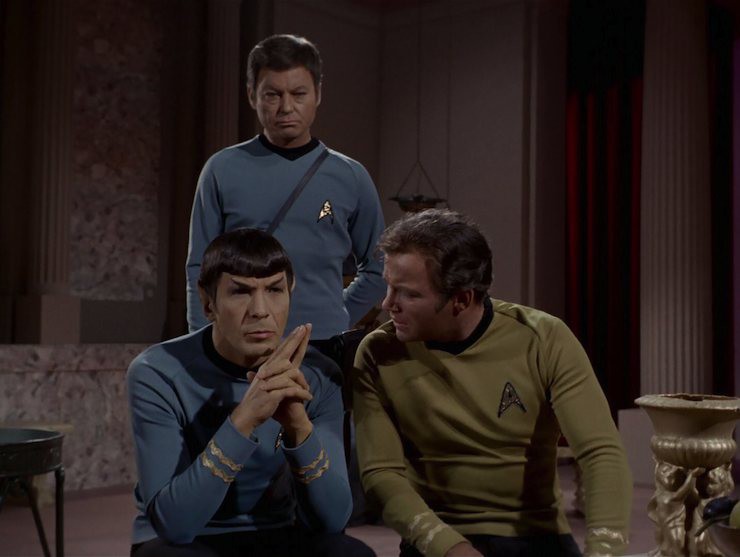
Worst of all, we learn in this episode that McCoy can give everyone super-powers with something he can throw together with the equipment in his medical tricorder! This is a major thing that, amazingly, has absolutely no consequences going forward! What the ever-loving hell?
I’m sorry, I know I’m not usually this histrionic in these rewatches, but it boggles my mind that this episode is solely talked about in terms of the damn kiss, when the kiss isn’t even all that big a deal, and also this episode is so incredibly horrible! This is the single worst episode of any Star Trek series, and one of the worst hours of television ever produced. Guh.
Warp factor rating: 0
Next week: “Wink of an Eye”
Keith R.A. DeCandido‘s latest story is “Right on, Sister!” in Limbus Inc. Book 3, a shared-world horror anthology that also includes novellas by Jonathan Maberry, Seanan McGuire, David Liss, and Laird Barron. It’s edited by Brett J. Talley and published by the fine folks at JournalStone.










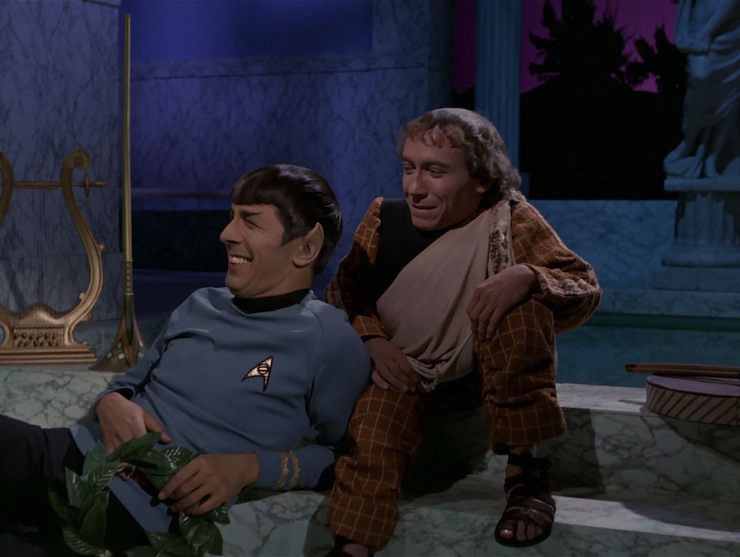
Kudos for giving an accurate description of the kiss rather than the misleading “first interracial kiss,” for which there are about half a dozen earlier examples. (How many depends upon how you define race. For instace, do Lucy and Ricky count? CBS executives apparently thought so given how heavily they tried to get a white actor to play Lucy’s husband.)
Small correction: This show is notable for having what most people THINK was the first interracial kiss on network television–but there were others that preceded it. It just gets the most press.
@2/Dandru – No, Keith spoke quite accurately. It is the first interracial kiss between a fictional black person and a fictional white person on TV. Memory Alpha enumerates the other interracial kisses that came before, but this is the first one of the type Keith described.
That said, this episode makes me regret my choice of watching every episode along with Keith, doing my rewatch alongside his. I really, really should have skipped this one. When it ended, though, my wife said “that episode had all my favorite things about Star Trek!” so I guess it was good for her…?
I remember this one. All the greek gods ones love to dive into do not want territory at warp five…
Not to give the script too much credit, but I never assumed that McCoy meant physically damaging, but invasive in a way that was going to be extra traumatizing for him, considering Spock’s culture, his extensive past history of being forced out of control and how much worse he took, for example, the plot device substance from The Naked Time than the rest of the crew.
“Alexander, where I come from, size, shape, or colour makes no difference–and nobody has the Power.”
I’m somewhat with Meredith’s wife on this one–the themes of the episode speak to what I love about Star Trek, I find Alexander’s arc quite moving (and well-acted, as even Keith admitted), and the above quote is one of my favourite lines in all of TOS.
It seems like the acts of humiliation are a big part of what made Keith feel embarrassed for the episode, but they’re supposed to be humiliating to the characters, so those scenes have their intended effect on a viewer who feels empathy for them.
@5/Edgar – I did forget to mention that Michael Dunn is the only reason this episode is barely watchable for me. He is a damn fine actor who died far too young.
For the record, when asked to elaborate on her “favorite things about Star Trek” as exemplified by this episode, my wife shared the following:
Has anyone in tie-in fiction used kironide injections for a power-up? I know it was never used in TV or the movies, but there’s so much tie-in fiction. Missed opportunity if not…
Boy! And I thought you were harsh with some of the Batman rewatch episodes! Not that this one doesn’t have it coming, though…
Something tells me Krad doesn’t like this episode.
That GIF of Kirk slapping himself is almost as satisfying as Tyrion slapping Joffrey
Mediocre sure, but the worst Star Trek ever? Not in a universe where “The Alternative Factor” exists. Oh, and that TNG episode where Barclay turns into a spider.
Because if something breaks when the boss is away you always try and fix it before they find out about it, that way you look like a cool person who Gets Things Done if you do solve it. If they find out about it before you fix it, you still get a reputation for Keeping Cool Under Pressure.
As for the quality. Yep this is bad. But while Spock’s Brain was bad in a dull and cliched way, this is bad in an OMG Whisky Tango Foxtrot Will They Do Next? It is like watching a car crash, a car crash into a clown parade. Someone did a lot of drugs and you’ve got to see it to believe it.
The worst thing? The Animated Series which follows is composed mainly of stories that got rejected for not even being as good or as coherent as this, Spock’s Brain, And the Children Shall Lead, Turnabout Intruder and all the other idiocy of season 3. That is right, the animated series is the rejects as being too silly or bad even by this episode’s standard.
It’s pretty much all been said, so a bit of Greek nitpickery: Kirk and Spock are wearing chitons, not himatia. The himation is essentially a cloak, just a big piece of cloth wrapped around the wearer when the weather is cold. It’s basically the Greek predecessor to the toga.
This may or may not be relevant, but that scene made me think of Phyllis riding Aristotle like a horse.
http://www.jehsmith.com/1/2013/04/phyllis-rides-aristotle.html
There’s a lot of competition in this episode for what makes it so very, very bad, but here’s a few no one else has complained about. First, the Enterprise’s sensors must just suck at scanning for life forms. How many episodes start (as does this one) with them getting a message yet Spock isn’t able to detect any life at the source of the transmission? (I’m assuming the problem is the sensors and not Spock.) You’d think after the 50th time that they’d invest in some better sensors, or at least stop acting surprised that there really is life on the (planet/asteroid/wherever) after all.
Second, can you really call yourself immortal if you have no immune system? And how does one go about not getting sick from anything EXCEPT infected wounds? Maybe they should make up some antibacterial ointment, or learn about hydrogen peroxide, or just learn to pour some distilled alcohol on those scratches.
Finally, how is it that telekinetic powers provide the knowledge of how to take remote control of a starship? Especially in a civilization that appears to be stuck in the early bronze age? And just how did they go about sending that distress signal in the first place? How did they even know that interstellar distress signals existed at all, or what type of signal to send that would be recognized as such?
The level of suspension of disbelief required to enjoy this episode is as high as it gets.
Never understood the hate for this episode. I always thought it’s scary because of all the absurdity, in the same way Twin Peaks is scary. All those ridiculous scenes are not simply embarassing, everyone gets hit at their weakest point. Kirk is paranoind about losing control – here he loses it full time. Spock loses hold on his emotions and is made to almost hurt Kirk during this tap-dance. Chapel gets the most twisted version of something she wanted, Uhura is to be a victim of someone she believes in and trusts, and McCoy is forced to watch people he loves suffer and is unable to do anything to help. That’s what saves this episode for me.
Sure, it has some horrible dialogues, tacky moments, McCoy making the kryonide is beyond my ability to suspend disbelief, and the ending is rushed and overall badly done. It’s not a very good episode, but for me it’s not one of the worst either. At least they tried to do something interesting, even if the attempt wasn’t very successful.
Immortal is not the same as invulnerable. There are lots of different types of immortality and immortal save injury or illness is one of the popular choices. Just ask Bernie Capax, he used to be immortal too.
Is it possible that this episode is so reviled by most viewers because it really hurls them out of their comfort zone? Torture porn episodes like The Empath don’t hurt anybody, but this episode apparently crosses the line, so much so that viewers aren’t even willing to really acknowledge any points of merit. Keith is probably very close to the reason for that when he mentions that we feel embarassed for the actors not the characters they play. But doesn’t this to a certain degree attest to the aesthetic power of the episode when it elicits such reactions? I’m not trying to really defend the episode, but it’s interesting how it manages to make viewers REALLY uncomfortable.
I agree with Darr — I actually kinda like this one. Certainly the episode has a certain ’60s goofiness, but it is a rather wrenching thing to behold the characters enduring such humiliation and psychological torture. Yes, these things were silly, but what makes them chilling is that they were forced to do these ridiculous things — that they had their control over their own bodies ripped from them and were compelled to act clownishly for the people who were violating them. That makes it more creepy than campy. And the sheer ludicrous grotesquerie of it was an excellent illustration of how decadent and shallow the Platonians had become, inflicting such tortures and violations merely for petty amusement, thinking it’s all about goofy fun when they turn sentient beings into mind-controlled slaves. I don’t think any TOS villains ever displayed quite so much sheer, unadulterated sadism as the Platonians did.
And flamenco dancing or not, there’s a palpable sense of danger seeing Spock slamming his feet down so close to Kirk’s head. I mean, if Nimoy (or the stunt performer that probably did it in the close-ups of Shatner’s head) had slipped just once, Shatner might’ve been in serious trouble. So I find that part a bit scary to watch.
There’s some terrific acting here as well. The scene where Kirk, Spock and McCoy are dealing with the emotional baggage afterward is very potent and well-played. Spock’s dialogue also makes an excellent statement about how vengeance is not the answer, about the need to let go of hate no matter the provocation. And Michael Dunn is fantastic as Alexander, a terrific character with a compelling arc.
I agree it’s clumsy to establish a way for humans to get telekinetic powers and then never use it again. But they did say in the episode that kironide was a rare substance. Also, I’d say just on general principles that injecting a heavy metal into one’s bloodstream on a regular basis is Not A Good Thing. Maybe Platonians have a freak immunity, or maybe it built up gradually enough that their bodies could acclimate, but I’d think it’d be pretty dangerous to do what Kirk and Spock did there on a regular basis.
What I have to wonder, though, is where McCoy got the kironide he injected into Kirk and Spock. He said it would take a while to extract and prepare the serum, but all he did was mess around for thirty seconds with the stuff he already had in his kit, and then he gave K&S the injections!
So either the director goofed up big time… or else the whole thing was just a placebo effect, and Kirk and Spock were able to wield telekinesis because they really really believed they could…
Yeah, I can’t add much here, because I agree with every word KRAD says here, but that kiss is nowhere near enough to save this embarrassment of an episode. Make any excuse for it you want, but ultimately this is an embarrassment for the actors, and the franchise, more than anything else. This one is so wretchedly awful it was almost painful to watch. No I take that back: it was really painful to watch. Michael Dunn was great, but again, not enough to redeem this travesty.
Worst. Episode. Ever.
I was going to do the Spock’s Brain comparison myself. That episode had redeeming value. There’s no sugar-coating here. Plato’s Stepchildren is quite possibly the very worst of Trek as a whole. Way to Eden is another close contender. Ironically, both shows were directed by David Alexander, and you can tell he phoned it in. I assume he simply didn’t mention Star Trek when applying to other directing gigs.
I can sort of see why someone came up with something like And the Children Shall Lead, dealing with child psychology in the final frontier. And maybe Gene L. Coon was trying to parody the idea of shows jumping the shark (pre-Fonzie, I might add) when he came up with Spock’s Brain.
But how on Earth did they get Meyer Dolinsky, an experienced writer who wrote for Mission Impossible, Bonanza and The Outer Limits, and then got him to deliver such a shoddy, padded effort like this one? Did Fred Freiberger or Arthur Singer even bother to revise or rewrite these scripts? Seriously, at least they tried something with shows like Children Shall Lead, despite the end result. This one reeks of everyone phoning it in. There’s nothing salvageable here, except maybe the idea of Kirk serving as a role model for Alexander, reiterating the fact that Kirk will willingly sacrifice himself for others.
Other than that, I got nothing.
Actually, that’s not true. I applaud Shatner and Nichols for shooting that kiss in such an awkward fashion and for supposedly blowing the safe kiss takes. It’s too bad it’s just another effort in padding an episode that should have been resolved in 12 minutes rather than 51.
I guess Comic Book Guy’s quote has its place. This is worse than DS9’s Profit and Lace, Voyager’s Threshold, TNG’s Unnatural Selection and Enterprise’s Precious Cargo.
I cannot bring myself to watch this travesty. The worst episode of Star Trek ever.
I agree with #4, in that McCoy’s saying that forcing emotion out of Spock would do him harm, he meant psychological harm, and not physical harm.
I also remember Nichelle Nichols saying about this episode, that it was supposed to be Spock who kissed Uhura and William Shatner spoke up and said, “If anyone’s gonna kiss Nichelle, it’s gonna be me! And by that I mean, Captain Kirk!”
Turns out there is a version of “Maiden Wine” that’s actually tolerable! Someone put a reggae beat behind it, and it’s actually pretty good this way! Check it out!
—Keith R.A. DeCandido
Oh, by the way, I forgot to do what I usually do, which is to comment on the musical score. “Plato’s Stepchildren” features the last full-episode score ever recorded for the series, so it’s fitting that it’s by Alexander Courage, the show’s first composer. After this, we only have fragments of diegetic music — Courage’s Orion dance music in “Whom Gods Destroy” (recorded at the “Plato’s” session), the songs in “The Way to Eden,” Ivan Ditmars’s Brahms paraphrase in “Requiem for Methuselah,” and Wilbur Hatch’s presidential fanfare in “The Savage Curtain.”
Courage’s “Plato’s” score is an excellent one, very fraught and dramatic, and it adds gravity and poignancy to the proceedings. It features two of my favorite act-ending cues from Courage — an intense minor-key rendering of Kirk’s motif at the end of “Dancing Spock,” and the marvelous closing fanfare on the main theme at the end of the episode (“The Little Visitor”).
The most interesting thing about the score, though, is that the staccato nine-note motif it uses to accompany the Platonians’ use of their telekinesis is almost identical to a phrase Courage used exactly once before, in the “Strangle By Wire” cue in “Where No Man Has Gone Before,” at the moment Gary Mitchell telekinetically strangled Lee Kelso. (Although that one is about half an octave higher, and the phrase has one less note at the beginning and one more at the end.) It’s interesting that he took that one isolated phrase representing an act of telekinetic violence in an episode from three years earlier and turned it into a leitmotif for the same idea. That’s a heck of a memory.
I watched this episode in shifts, if you will, around my fitness class last night. It was a struggle to finish, and that’s not just because I was exhausted after class. Michael Dunn is the only redeeming thing about it. Too bad they didn’t make better use of his talents.
@12: I seem to remember the Animated Series as being a long line of “plants or other parts of the landscape hate Spock and continue to attack him,” mixed in with, “too silly or aesop-y to be accepted unless a regular series writer pitched it,” (because I don’t think the Slaver Weapon was actually <i>worse</i> than Omega Glory, or Lights of Zetar or… a good quarter of season three, actually,) combined with “Things that were kind of cool but only possible to do in animation at the time,” and a lot of “good lesson for the kids,” episodes, or just lines tacked onto episodes.
… But it does make me wonder if Spock’s re-integration into his body in the movies worked out so well because we’ve got at least two prior instances where his body and consciousness got separated and rejoined, one in Spock’s Brain and the other in The Infinite Vulcan. (We can probably ignore Spock’s giant double wandering the universe, since it never comes up again.)
@27/Quill: Although Filmation was known for its educational/moralistic focus, TAS wasn’t really aimed primarily at kids. It was consciously designed and overtly promoted as the first adult-oriented Saturday morning animated series. Aside from toning down the sex and violence, they tried to write it on the same level as TOS. Yes, it had its share of bizarre and silly premises, but so did TOS — the subject of this week’s rewatch being a case in point. (A giant Spock clone isn’t that much weirder than a giant Greek god with a green energy hand in space, and the crew shrinking to tiny size isn’t that much more implausible than the crew being accelerated to hyperspeed.)
Whenever I declare an episode so bad that I do not want to revisit it, I try to find some small part of it that has merit. For this one, my notes say “discussion of girl’s age and utopia.” I have no idea now what I meant based on the article and comments, but there you have it.
@29/brandonh: The only thing that “discussion of girl’s age and utopia” could refer to is this exchange:
Along with all the other ridiculous things in this episode, one thing I found that was curiouser and curiouser was how the Platonians could know about Lewis Carroll’s inventions such as Tweedledee, Tweedledum, mimsy toves [sic] and borogoves. After they left Greece in Plato’s time did they come back to Earth later and obtain or read Carroll’s work? (Not to mention get things wrong. It was the borogoves that were mimsy, not the toves, which were slithy.)
@31/richf: Two possibilities:
1) They have telepathy as well as telekinesis, and drew the information from their victims’ minds.
2) Since they had the means to control the Enterprise‘s instruments and freeze its engines and systems, they may also have been able to read its data banks.
First of all, Michael Dunn is terrific– one of the best guest appearances ever. He carries this episode.
Second, leaving aside the fact that episodes in which the special guest planet is some version of historical Earth culture got old, I’d say that this one had some interesting Stanford Prison Experiment things to say.
@33/Bill Altreuter: It occurs to me that, if they were going to reference an Earth-historical culture, they should’ve gone with Rome instead of Greece, because Rome was known for its decadence and sadistic entertainment, as well as its practice of slavery. But I guess they already went to that well in “Bread and Circuses.”
Help me out here, classicists. Is there anything about the “Platonian” culture seen here that actually reflects Plato’s writings in any way? Or was it just an excuse for the show to recycle Greek costumes and props from the studio vaults? I guess their rarefied, no-work society of the mind reflects Plato’s ideals to an extent, the pure and the intellectual transcending the physical. But the hedonism and the sadism? That seems like the Platonians’ own particular corruption of the philosophy. Or maybe we should be invoking Lord Acton more than Plato there.
To be fair, Christopher, Spock himself pointed out that they were Platonian in name only. Kinda like the Holy Roman Empire, which was none of those three things………….
—Keith R.A. DeCandido
This is one of the few episodes of Star Trek I’ve yet to see. Looks very silly, but I’m tempted to watch it just for Michael Dunn, who was wonderful as the villain Loveless in The Wild Wild West.
@33 Re Michael Dunn’s character in this episode, given that most roles for little people in movies and TV of that time were usually either villainous or comical, is certainly outstanding in his sensitivity and the visible tragedy of his efforts to cope with the constant pain and humiliation with some kind of dignity and self-respect.
@35/krad: Sure, but I’d be interested to hear a more in-depth discussion of the differences between what the Platonians claimed to believe and what Plato actually taught, if anyone here is enough of a classicist to offer some thoughts on it.
@36/Arthur: I remember back in the ’80s or ’90s when TNT showed Wild Wild West reruns daily — there was one week where they showed the first five Miguelito Loveless episodes on consecutive days (or maybe the first four and a later one), and it was kind of sad to watch. Because Loveless debuted as a wonderfully complex, nuanced, morally ambiguous, sympathetic villain who was basically trying to carve out a safe space for misfits and outsiders, but with each consecutive return appearance, he became less complex and less well-developed until he was simply a one-dimensional cartoon villain. Dunn was great in the role, but the writers really let him down as the show went on.
You know, I have to say that I enjoyed this episode a lot more than most of y’all. Yes, it’s got a lot of howlers, but Michael Dunn’s performance is really the point of the whole thing, and to me it is so made of tragical, comical pastoral-historical awesome that I forgive the rest of it. Plus, I agree with Lubitsch at #18, I think it’s possible that one’s discomfort with/revulsion for this episode comes from the fact that the humiliation of the characters/actors is not, in fact, ineffective but all too effective. In this respect, I’d say that the episode comes off less “Platonic” than “Aristotlean” – certainly the characters’ plight arouses the requisite amount of both pity and terror for *me*!
Count me as one of the people who doesn’t really get why everyone hates this episode so much. It seems to me that the very thing that people hate the most about the episode (the discomfort) is precisely the thing that proves its success. I’m with those who point out that this is pretty much the most chilling episode of the whole series. Yeah, it makes me cringe. But you know, we’re meant to cringe. That’s the point…
Awful as this episode is, it still ranks higher for me that both Spock’s Brain and The Omega Glory, and Way to Eden, and a few others. It has the advantage of Michael Dunn, who is terrific, and who saves the episode from the complete depths. IMO Spock’s Brain is far worse.
@18 and 39: FWIW, I myself find “The Empath” far more deeply disturbing than “Plato’s Stepchildren,” because the torture is more realistic and it makes me think of people currently being tortured. An artistic work has to have really amazingly great humanistic depth to bring me to endure depictions of realistic torture. And no, the vaguely biblical references and artificial parlor-game version of self-sacrifice in “The Empath” do not make the grade (and I say this as a churchgoing Christian!).
“Plato’s Stepchildren” makes me cringe, but not because the bizarre manipulation of people to do embarrassing things is farther out of my comfort zone. It makes me cringe because (Michael Dunn aside) it’s so badly done that the whole episode is embarrassing. I would argue that the fact that many of us look at those humiliation scenes and think NOT of what this would mean to Kirk and Spock and Uhura etc. but of the actors being forced to do these things is the clearest evidence that the episode does not succeed in what it sets out to do. I can imagine that it would be possible for a story to show the Enterprise crew being humiliated by mind control, and that I the viewer would empathize with the crewmembers and imagine the extreme distress of being forced to clown or kiss for my oppressors’ enjoyment. But I, at least, don’t feel anything like that while watching this episode. Instead, I feel, “Oh, poor Leonard, you deserve better than this….”
For me, what happens to the characters throws me out of the story. Whether it’s a question of discomfort or that it just doesn’t play credibly, I see Shatner and Nimoy, not Kirk and Spock. Although I will say the kiss plays differently now than it seems to have back in the 60’s. What I saw raised issues about sexual abuse of Kirk and Uhura. It’s hard to see how people saw it as step forward in portraying inter-racial romance.
Getting back to the Platonists, I don’t know much about the Philosopher King (I think there were five minutes devoted to the subject somewhere in college but I may have dozed through them. Sorry). But, I did a little online research and read some summaries. One thing that was interesting in context of this episode was the philosopher Karl Popper. Popper wrote a book pointing out that the Philosopher King must ultimately function as a dictator who keeps his society perfect and in balance through isolation, social stagnation, propaganda, and control. Except for perhaps the propaganda, we see all of these functioning in the Platonists small society.
I’m not sure what I think of the Platonists origins. They’re a population of 38 more or less immortals. They suggest they’re all that’s left of their society. What happened to the others? Genocide? If they killed off the “inferior” members of their people, why is Alexander alive? Is this one of those cases where increased longevity decreased fertility? Were these the immortals and the merely long-lived died out? Or was there some reason he was allowed to live if they were weeding out the unfit?
I also have to wonder if they haven’t caught the occasional ship before and used up the crews for entertainment. They seem the type.
Saavik said it best. It’s an embarrassing, cringe- inducing episode because of the actors having to perform this travesty. I’m not thinking of the characters at all. Can you imagine getting this script after having done so many intelligent, thought-provoking episodes? This is where I’d have started to question if the show had “jumped the shark”, if you will.
You’re nicer than I am regarding this, the absolute worst episode.
I give it a negative rating. Like negative 10.
@richf #31 and @ChristopherLBennett #32 Could it also possibly be that the Platonians were just putting vague ideas into the crews’ heads, and they were coming up with the actual words themselves (although that begs the argument of how Kirk and Spock were on the same page…though that could have been their own natural bond to each other, heightened by the Platonians’ mind control causing that)?
You know, I watched through TOS a couple of times in the mid 80s but I have no memory of seeing this one. I’ve since read about it, certainly, the notoriety of this episode guaranteed I’d know about it. So I just went and found it online and watched it.
Of course, my thoughts were influenced by the comments above.
This wasn’t quite the steaming pile I thought it might be. Yes, some of the forced-actions were a bit awkward, but not as bad as I thought they’d be. The last scene with Uhura and Chapel was really the only one that was cringeworthy to me. Nimoy’s song was not good, true. But other than that scene, I thought Nimoy… and Kelly both played their roles fine. Shatner was… well, Shatner. Dunn was very good as Alexander. My biggest problem was the plot itself, the whole setup was just not believable. And the resolution, McCoy says “it’ll take some doing” to induce the Power. 20 seconds later he has it. Eye-roll time.
As I mentioned, I’ve not seen much of TOS since the mid 80s. However I did get for Xmas a few years ago, the entire series box set of The Wild, Wild West. And I watched through them all. I very much agree with Christopher @38, that the Loveless character was not written that well as the series progressed. I still think Dunn did the best he could with the role though, as he did here on this episode.
@38 – Chris:
Sounds like a book pitch is coming up. :) (Or at least, you and Krad are in a much better position than most of us around here.)
Various types of mind-control resulting in characters being forced to do things against their will was kind of a staple of early TV SF (think of “It’s A Good Life” from The Twilight Zone, at least one Lost In Space episode I can recall), and this really took the concept to the limit. I don’t know if it was something in the psychic water in that era, or if it was just a cheap way to create an eerie effect (even now, despite the cheesiness, it is squirm-inducing to watch well-known characters struggle in this way).
@49/sardinicus: I think budget was definitely a concern. Look at how many TOS episodes involve characters psionically forcing other characters to do things — “Where No Man Has Gone Before,” “Charlie X,” “And the Children Shall Lead,” etc. Not to mention various other forms of mind control or mind alteration (“The Naked Time,” “The Return of the Archons,” “Return to Tomorrow,” etc.) It’s a way to depict a science-fiction premise without any visual effects, since it’s just a matter of acting and pantomime. So naturally it’s a well that SFTV returned to frequently.
But I think the fear of losing control or identity is a basic one that drives a lot of stories, in any era.
@@@@@34/ChristopherLBennett: Is it possible the intention was to explore the ways human weakness could corrupt Platonic ideals? The idea of immortality causing people to lose their morality, to view life as worthless, is a common theme in fiction. Perhaps that’s what the show was going for here: thousands of years alone has made these people sadistic through their boredom.
@51/Scott Miller: Yes, I think that was exactly the point. I’m just wondering about the specifics of how their practices diverged from Plato’s teachings. The why is self-evident (power corrupting and all).
Hey folks! Real life has been horrible lately, and my moving crisis has combined with a nasty deadline to delay the rewatch. With luck, we’ll have “Wink of an Eye” tomorrow…..
—Keith R.A. DeCandido
Semi-useful information: This Agony Booth article showing that Europe did it first, as usual.
Great link, Rod. I loved this bit in particular:
I would’ve awarded at least a “1” for Michael Dunn, but that is generous. Spot on target for the rest of the review. I cringe any time this one comes on ME TV.
#55, A Lot of people back then, and probably now also, thought that as long as you weren’t black, you’re white, no matter the ethnicity. I have a friend who is Brazilian and she looks it, olive skin, accent, the whole nine yards, and she said that attitude was done on her, and that was just within the last ten years or so.
@55 and @57 I watched a documentary, I forget what it was called, a few years ago about racism in Hollywood and how directors did not care when casting certain minority roles. It claimed that the ethnicities that Hollywood recognised right up until the start of the 1980s were Black, East-Asian, White, Irish (Red-Headed with “rugged” looks), and then (and I apologise, but this was the term used and it has stuck in my mind ever since because of its awfulness) “Dirty White” which could refer to Persian, Southern Italian, Greek, Mexican, Native American, mixed race, Spanish, and pretty much anyone who did not fit into a neat little box. By that standard Barbara Luna would be white, but a “dirty” (god that is horrible and gets no less horrible) white. Obviously this all has no relation to real ethnicities, but since when has Hollywood and the entertainment industry ever been accused of accuracy?
I think, if we really wanna get technical, this isn’t the first interracial kiss, it’s the first time someone kissed a black person who wasn’t black themselves because there were interracial kisses all the time, not just Shatner and Barbara Luna, but much more famously, what about Lucy and Ricky? And lots other, I’m sure. This kiss just basically took the fact that there have been interracial kisses since time immemorial and threw it out into the public’s face, a move long overdue.
@57 – Leandar: Brazil being a neighboring country of my own, I can tell you that they have, in certain parts of their culture, a deeply entrenched racism that as long as they’re not immediately and unequivocally identifiable as black, they’re automatically white and superior to black people. I’m not saying it’s everybody, but it exists, despite Brazil’s self-promoted image of being a melting pot.
@58 – random22: It happens to this day, when they still hire any Asian to play any Asian nationality, and Hispanic/Latino people to play Middle Eastern, etc. It’s happening less and less, thankfully, and while I cannot compare this gripe to the more pressing under representation of Black people or darker-skined Latinos in positive roles (IE not always gangbangers, exotic lovers, or ilegal immigrants), I’m happy that in recent years Hollywood has accepted that white-skinned, fair-haired and eyed Latinos do exist.
@59 – Leandar: Exactly, take a look at the article Rod linked in #54 and that I quoted part of in #55. The writer gives a good account of why a specific kiss could be considered as “not counting”. For example (and I’m paraphrasing), about Lucy and Ricky, it basically says that a) Lucy and Ricky are both of European descent, b) while Ricky is not exactly pale, it’s not like his skin tone is that much different than Lucy’s, and c) the US didn’t have Latino/White segregation laws and deeply entrenched negative sentiment against those relationships as it did in some parts of the country against black people, particulaly black men “stealing white women”.
It also mentions an interracial white/black kiss in British TV years before Star Trek, but the UK never had the same laws and anti-black sentiment the US did (not saying racism doesn’t exist there).
@60/MaGnUs: That’s a shame to hear about Brazil. I’d heard so much about what a colorblind, diverse society it was.
It’s sad how much the attitudes from the slave era linger in many parts of the world. I once heard about how, in countries on the Swahili Coast in East Africa, a lot of people who are clearly of African ancestry insist they’re pure Arab, because of the stigma about being descended from slaves. I find that bizarre. I would find it much more honorable to be descended from a slave than from an enslaver. (Although I may not have that choice. If I have any nonwhite ancestors, they must make up a very small part of my genetic code and are unlisted in the family genealogy. My maternal ancestors came from Virginia and some may have fought for the Confederacy, but I don’t know if any of them owned slaves.)
What sucks is that racism was basically just something the rich invented to screw over the poor. Before the slave trade, Europeans saw Africans as exotic, but not particularly inferior. But the Southern and Caribbean plantations had such monstrous working conditions that the only way they could turn a profit was by working large numbers of slaves to death, and so they invented the idea that African slaves were subhuman so that it would be seen as okay to treat them like animals. So it was just one more lie the rich and powerful elites convinced the masses to believe for the elites’ own benefit. And today, so many cultures around the world are still warped and torn apart by this lie invented for the expedience of rich people who’ve been dead for centuries.
#60, I’ll grant you your point and like Christopher said, I’m sad that they’re that racist too, but the incident I’m referring to with my friend happened to her in the United States.
Speaking of racism Christopher, #61, it just goes to show, that despite the popular concept that America is the only racist place around, here is proof that we’re not only the worst when it comes to racism, but apparently some countries are far worse! We talked about this a little bit last semester in my family law class, about how it seems everyone expects these attitudes to just disappear, now that rights are being established. Think about it, and of course I’m only talking about America, cause it’s the only country I know these dates for, but women haven’t even had the right to vote for a century yet, civil rights is barely fifty years old, and we’re expecting attitudes about various peoples that have lasted for centuries, in some cases, millenia, to just disappear in a generation or two? No. Ain’t gonna happen. Doesn’t mean we can’t try to make it happen but it’s even shown in TOS that we’re still a work in progress, and after TNG was allowed to get over itself, and the writers stopped acting like everyone was perfect, all the shows have seen that we’re still working on it, as far as we seem to have come in four centuries. Do I think we should stop trying? No, but I think we should let ourselves be proud of the progress that we’ve made and strive to continually improve. I think that is the basis of the ideals of not just Star Trek, but for bettering humanity as a whole.
@61 – Chris: Oh, don’t get me wrong, there are still many awesome aspects of what African slave culture and European culture achieved by mixing in Brazil (and, to a lesser aspect, my country; search Youtube for Uruguayan candombe), but well, racism exists, as in any place in the world…. it’s particularly insidious when it’s poor people looking down on other poor people just because their skin is a few shades lighter.
@62 – Leandar: Yes, I gathered it was something in the US, but if she’s Brazilian, the cultural aspects would come from her education there, or her family’s. Although, I have to ask you to clarify, what exactly happened to her? Your post, re-reading it, is a bit unclear.
Also, let me point out that “a friend who is Brazilian and she looks it, olive skin”, Brazil is an ENORMOUS country, and while that is one of the stereotypic Brazilian looks (she’s probably a mix of white, black, and native); there are areas of Brazil that are populated by descendants of German and northern Italian immigrants, and their usual look is very fair skined and blonde with blue eyes… here in Uruguay we also consider that a very stereotypic Brazilian look. Outside of South America, and even outside my country, that is near those areas of Brazil I mention, I know the Brazilian stereotype is the one you mention.
@64/MaGnUs: Yeah, a while back, Michael Palin did one of his BBC travel miniseries on Brazil, and I remember him visiting that German enclave, which was kind of surreal. But the series did showcase the enormous diversity of subcultures in the country, including indigenous villages in the Amazon.
Well, describing her as olive skinned is lifted right from her own mouth. Her family is a hodge podge of ethnicity, some native Brazilian, her mother is, as you describe, fair skinned, and while I don’t believe there’s any black in her line, she had said that there is some Italian in her line as well as Portuguese. There is also native Brazilian and supposedly, one ancestor who may have been of Japanese descent.
I had heard before the idea of if you’re not black, you’re considered white, and she said that she had heard that too, and someone told her she was white cause she wasn’t black. I don’t remember the exact details, it was a number of years ago that the conversation occurred.
The main theme of “Plato’s Stepchildren,” although poorly-executed, is that a society shouldn’t be judged by its intellectual attainments, but by the way it treats its most-vulnerable, least-powerful citizens. That’s at least a nice moral, and it articulates Star Trek’s vision that someday everybody will be judged solely for their character and not the body that houses it.
The main theme of “Turnabout Intruder,” on the other hand, is that girls have hormones that come out of their lady parts and eat their brains. Which, need we even say it, make them flighty and emotional and totally unreliable. I mean, sure, it might be nice to have them around to look nice and answer phones; but you seriously do not want to put them in charge of anything or they’ll have mood swings and public meltdowns and next thing you know they’re literally trying to execute people for talking behind their backs.
(This notion that women are incapable of handling anything more pressing than secretarial duties without bursting into tears maybe contradicts the unaired pilot episode’s depiction of a female First Officer and regular series portrayals of women with careers as bridge officers, scientists, psychiatrists, academics, diplomats, and attorneys. And that’s without looking into the future with post-Original Series events like Uhura taking the comm and Uhura and Chapel leading an all-female away team to gloriously blow up a bunch of stuff when all the ship’s guys are incapacitated by space sirens in The Animated Series. Or Crusher and Troi taking the center chair on the Enterprise-D in Next Generation (Crusher eventually getting her own command in an alternate future), and all the assorted female commanders, captains, and admirals we meet over those seven seasons. Or Captain Janeway. Which makes the whole episode not just embarrassingly misogynistic, but also arguably a 47-minute-long continuity error within the entirety of the series. You know, if the embarrassing misogyny isn’t sufficient for whatever reason.)
In short, “Plato’s Stepchildren” is undeniably a terrible episode in all kinds of ways. But it’s not the show’s worst. (I’d say it’s not even the show’s second-worst, but maybe that’s because I’m one of those pinko types who is embarrassed by the kind of reflexive patriotic chest thumping that “The Omega Glory” implodes into.) I really think you may have broken your scale with this one: you’re going to have to go into negative points when you watch “Turnabout.”
It’s bad. It is sooooo bad.
@67: I haven’t seen Turnabout Intruder in a long time, but from my memory of it, nobody other than Janice Lester says that Starfleet excludes women from command so it is quite possible that Starfleet has no such policy at all and it’s strictly her delusion due to the fact that *she* is unqualified. But we’ll certainly find out whether any other dialog supports her claim when our humble rewatcher gets to it.
@68/richf: Oh, certainly the dialogue is ambiguous enough to allow glossing over the implication and dismissing it as Lester’s delusion. But it’s pretty clear what the writers intended it to mean. We’ll get into that when the time comes, I’m sure.
Okay, this is cringeworthy, but I don’t find that it’s the worst episode. It isn’t even in my top five of bad episodes (or is that “bottom five”?). It has a fine, star-trekky moral, and some other bits and pieces I like.
Alexander is a great character. I also love the whole Alexander-Kirk interaction. This is one of the episodes where Kirk is a really nice person. I agree that “a little surprise” is annoying but I don’t find that it undoes most of the tolerance. I like it especially that Kirk kneels down to look at Alexander eye-to-eye when he calls Scotty. For me, that undoes the damage done by “a little surprise”.
After all the episodes where McCoy has been mean to Spock and all his criticism of the Vulcan way of life, I love it that he’s the one who protests and is outraged when the Platonians make Spock laugh and cry.
I like the way the characters behave when they are finally left alone – first they check on each other to make sure that everyone is okay, then they go straight on to look for solutions. I like it that when they find a solution they’re still in trouble because they don’t know when it will start to work. That’s an unusual plot device.
Finally, I agree that Parmen is lame but I like Philana as a villain. She obviously gets off on the humiliations – she’s practically leering. I think Barbara Babcock plays that very well.
I agree that “a little surprise” is annoying but I don’t find that it undoes most of the tolerance.
I usually think so, too. On the other hand, sometimes – sometimes – when people have built up enough of a relationship and a trust with each other, they can make jokes about such things to each other without causing offense. Granted, Kirk says this to Scotty, but (for whatever reason) it makes Alexander smile… so maybe this is one such situation? Not trying to excuse intolerance, just wondering if perhaps the script was going for more than a cheap laugh.
So is Orion’s Hounds really the only tie-in fiction appearance of Alexander after he left Plotinus? I would have thought multiple interpretations of his fate would have shown up, as they have for so many other guest characters – especially when Alexander’s story ends on such a hopeful note.
@71/Mike: To tell the truth, I never even noticed that “a little surprise” was problematic before I read about it somewhere on the Internet – I think it was the previous rewatch on this site. As I wrote above, I love the Kirk-Alexander interaction, and Alexander seems to be happy and full of anticipation in that scene. So I gladly subscribe to your reading.
I’ve been missing stories about Alexander’s future life too.
Yup, I agree. Never thought anything bad about that till the Internet and Alexander seemed fine with Kirk referring to him like that.
Hey folks. Once again I must plead insanity. Between a forced move and two nasty deadlines, I just will not have time to do the rewatch this week. I hope to be back on track with “Wink of an Eye” either later this week or, more likely, next Tuesday.
—Keith R.A. DeCandido
@18: Christopher, if this episode disturbed you, I suggest you watch the 1979 unedited version of Caligula. It is, without a doubt, the most disturbing dramatic film I have ever seen. It features a crazy, power-hungry Roman emperor using physical torture and non-consensual sex between slaves only for sadistic pleasure.
I am not a prude and I have seen plenty of violence in movies ever since I was a child, but the combination of rape and torture for entertainment of a madman was particularly disconcerting for me.
The movie has plenty of bad reviews as this episode does, but it nevertheless it is still a historically important film as it is the first American film with non-simulated sex released in mainstream theaters. And it does make an important statement about the dangers of absolute power.
A forced move, Keith? That doesn’t sound pleasant. Take care and we’ll see you when we see you!
MikePoteet: We’re on a month-to-month lease, which means both we and our landlord have the privilege of terminating the lease with a minimum of 30 days’ notice. Our landlords availed themselves of that option in late July (actually giving us 40 days notice), and our lives have been a scramble of hunting, packing, and moving, and will continue to be for the next two weeks — with me having two major deadlines on top of that. So yeah….
—Keith R.A. DeCandido
Keith – So sorry to hear about the unforeseen stress. Best of luck and godspeed!
I anticipate both rewatches being back on track this coming week, with “Wink of an Eye” on the TOS Rewatch on Tuesday and “That Darn Catwoman”/”Scat, Darn Catwoman!” on the Bat-rewatch on Friday.
Thanks everyone for your patience and understanding.
—Keith R.A. DeCandido
You’ll all be pleased to know that I uploaded the rewatch for “Wink of an Eye” earlier today. So it should be up Tuesday at 3, just like it’s supposed to. :)
—Keith R.A. DeCandido, grateful to be back in the rewatch saddle
“Wink of an Eye?” Ooh, of all the episodes to run slow on… ;)
Christopher: I KNOW, RIGHT??????
—Keith R.A. DeCandido
I am six months late to this party, but I must point out that Jo Walton has already (and recently) written a trilogy about the goddess Athena using time travel and robots to build a society using the principles of Plato’s Republic. It’s published by Tor, incidentally.
This may be the most cringe-worthy Trek episode but IMO not the worst. As has been noted by others, there is some good acting in moments when the actors are not doing silly things, and even the silly things are depicted for a purpose. I tend to agree with the thought that the viewer is supposed to have his/her comfort-zone challenged. My emotional reaction to the “Gods ” here was heightened by my disgust at what they made Kirk and the rest do. Alexander’s growing confidence and sense of dignity as the episode progresses is a pleasure to see. Yes, there are some missteps. Big ones. But as I have said before, the questions I ask myself while considering the quality of an episode for my own purposes are: was it Interesting? Did it make me think? And would I watch it again. Yes to all 3. Now, if you want me to rate it on a a scale of artistic aesthetics, it’s way down the scale….
I just watched this episode for the first time and all the way through because of the notoriety including this review and you know what? I didn’t think it was that bad and hardly the worst of what Trek has ever produced. Yes, what our heroes have to act out is extremely silly and embarrassing but that’s the whole point – to humiliate the crew and rob them of any dignity, and for Spock, his emotional control. I found it all very dramatic and riveting stuff. And then the female crewmembers are basically sexually violated by their male comrades and the males are forced to be the perpetrators. Just awful awful stuff that reinforces how nasty and evil the Platonians are. I like Kirk’s line to Alexander about how he wouldn’t be judged for his size – how very Star Trek! There’s some good acting, and of course you have the first ever interacial kiss between fictional characters. So overall, not a good episode, but hardly horrible either.
This episode upsets me so much that I’ve never watched it through. I suppose that says something about it’s quality.
86, it’s so painfully insightful that you can’t manage to handle it?
Ok, ok, there must be some germ of wisdom to be found, maybe?
Basically I can’t handle the crew being viciously humiliated. Does that mean it’s done very well? I’m not sure. Krad certainly doesn’t think so.
“Name your worst Star Trek episode” would seem to have serious potential as the basis of some kind of personality test.
I actually enjoyed this episode, because I took it for a comic episode, and the only moments I really didn’t like were when Kirk started waving a whip at Uhura and Spock got way too close to Christine with a hot iron – partly because these were uncomfortable moments in themselves, but possibly also because now I had to start taking it seriously.
It occurs to me that there are really only about a dozen ST episodes that I take seriously (even when they are intended to be comic!), yet I am able to enjoy a number of things in nearly every episode, just because I enjoy these actors so much. The only episodes that I really thoroughly dislike are And The Children Shall Lead, with Turnabout Intruder a close second.
By the way, Michael Dunn had a good part in “You’re a Big Boy Now”, a comic film by Francis Ford Coppola. Yes, you heard that right: a comic film by Francis Ford Coppola. His student thesis film, both written and directed by him. A rather silly film which I nevertheless enjoyed. But be warned: I’m the person who got a kick out of Spock’s Brain (Brain and Brain! What is Brain?!)
And I rather liked Parmen (the actor who portrayed him) for the role of Emperor Shaddam IV in Dune, in both attitude and looks. Would have been way better than Jose Ferrerr, assuming he were still alive then.
Does this episode cause discomfort? It was banned in Britain for decades.
@90 There is a lot of cruelty and sadism on display in this episode, perhaps more than any other episode, it is not a pleasant episode to watch at all.
Mm: As I said right there in the “Trivial Matters” section of this very article that you’re commenting on right now:
—Keith R.A. DeCandido
At least in those other episodes the violence serves as a valid part of the plot and story progression, in this it just feels like the writer just wrote in something sadistic for the sake of sadism. It throws no light on either our characters, nor the antagonists own particular personalities other than to show they are baddies.
@93/random22: That’s just the point, though. The Platonians are pure sadists for the sake of sadism, corrupted and made cruel by their power.
So I couldn’t help but reply when I saw this thread had been revived. This episode happened to be on TV last night – I only caught the last 20 minutes or so…didn’t remember what episode it was and also didn’t remember much about it at all! It’s been a while since I’ve watched Trek, so was slightly worried this was a typical example of a Trek episode and my memories were rose-coloured. Thankfully, I see from the review here (and majority comments!) that this is considered to be one of the weaker episodes.
I didn’t think it was utterly horrible though, as from the part I saw last night, I did appreciate the back and forth between McCoy, Spock, Kirk & Alexander and really enjoyed the kindness exhibited by Kirk & the courage and pathos exhibited by Alexander. The scene with Spock & Kirk being made to run back and forth and then the forced kisses was very…uncomfortable to watch. Nonetheless, this episode was still Trek and I did enjoy it, warts and all. =) I forgot how Shakespearean Trek is. Science fiction yes, but it feels so much like watching a play at times.
Having just watched “Spock’s Brain” and this one back to back, I don’t see how anyone could possibly say this is worse than SB. With the possible exception of one scene in which the characters agonize over making the obvious decision, SB is absolutely and utterly stupid with no redeeming value whatsoever. The only even remotely Star Trek element to the story is the basis of their civilization and the effect on it by the knowledge machine, but that’s completely glossed over with a couple of sentences. It’s the worst Star Trek episode because it is the least Star-Trek episode.
“Plato’s Stepchildren” is bad, but at least it has some decent ideas in it. At least those ideas are Star Trek-y ideas. I think the episode’s biggest problem is that the script is too short, and so they padded it with all the humiliation and extended torture scenes. Yes, there are other problems — I’m not at all defending this episode — but at its core it is attempting to be what Star Trek is about. It fails because the ultimate lesson is that the meek and powerless can only thrive if some benevolent leaders overthrow the despots, but at least it tries. At least it feels like a Star Trek episode.
Think about it this way: Which episode has been more damaging to Star Trek over the years? “Spock’s Brain” is laughable from the moment you read the title and it never gets any better. If you only watched that episode, you would think Star Trek was all B-movie sci-fi, most likely. But if you only saw Plato’s Stepchildren, you would at least see that Trek was trying to be about something, that it at least had potential. Given that, I have to say no, PS is not worse than SB.
The discussion in #54 through #66 brings to mind the attempted seduction scenes between Uhura and Mirror-Sulu in Mirror, Mirror. Were those interracial scenes edgy for their time, or did such things not matter unless a white person was involved?
Unless white people were involved it was not a big thing.
@97/BeeGee: In normal usage, “interracial” means your race with any other race. “Multi-racial” would be used to mean the number of other races matters.
When rewatching Star Trek, I always find myself looking forward to this episode, especially on the strength of the interactions between Kirk and Alexander, and Michael Dunn’s performance in particular. Nothing Keith says in this analysis about its flaws is wrong, it just leaves me with a different experience regardless.
The humiliation scenes worked on me perfectly. My first time watching I was horrified for what my favorite characters were going through, and appalled at the banal, naked cruelty of the Platonians. As a result, Alexander’s denunciation and anger were incredibly satisfying to me, as well Kirk’s disarming challenge to him stopping him from killing.
So the presented story elements were indeed terrible, but the emotional impact was so effective it actually puts it among the top memorable episodes for me. A horrible episode that is part of what made me love Star Trek.
As for the ending, I must paraphrase “Borderlands” and refer to something that happened so many times. “And then Captain Kirk said something stupid and ruined everything.”
I first saw this episode when I was 10 or 11 years-old back in the early 70s. Even at that age, I could fathom the moral of the episode: great power in the hands of a few usually causes those few to become total dicks. Or, as Lord Acton so succinctly put it: “power tends to corrupt; absolute power corrupts absolutely.”
On an other note: Who were the Platonians dicks to before the Enterprise came upon them? Didn’t the hide their planet? Did they just torment and torture Alexander for the millenia? Or, were they sadists to each other in a round-robin sort of way? Or, did they bait unsuspecting spaceships just to torture and torment the crews? If so, that’s evil.
Michael Dunn’s performance is amazing in this episode.
@100/@101: Yeah, this episode belongs to Alexander.
Not a great episode but not really as bad as all that. The torture scenes were dragged out too long. If they’d been shortened, maybe more time could have been spent on a plausible solution. The KIronide solution, as it is, is certainly not the only time in Trek history that the writers dropped some major advancement like cloning or immortality and then forgot about it.
“You’re very good at making speeches, Parmen. Just make sure this one sticks.” That line has always stuck with me since I first watched this in the 80s. I’ve thought of it whenever I’ve heard someone just giving a lot of lip service to ideals.
Biggest disagreement I’ve had with a Krad rewatch score. I’m watching in order of air-date, but for me this is the best episode so far of Season 3. The “cringey” scenes of the main cast doing silly things were for me totally believable as the manipulations of a telepathic sadist. Alexander was a great character. Nimoy’s acting was fantastic as usual- particularly in the scene after he stepped on the Captain’s face. Shatner’s acting was very good as well- as someone said, he came across as very kind and heroic. And seeing the heroes so helpless and humiliated really made the stakes seem high.
Also, this episode has less or at least as many plot holes as the rest of the season so far. The only real problem is that I didn’t know Tricorders could synthesize gene-altering chemicals on the spot. (And as another rewatcher mentioned, it’d have been nice to learn more about the Philosopher King and other Platonic rules without researching them one’s self). Compare this with Krad’s favorite “Day of the Dove” where the entity 1) unnecessarily lets itself be seen and 2) supposedly feeds off the anger while also causing the anger directly, which is kind of like if I were to eat sandwiches to stay alive but also have the power to transform rocks into sandwiches.
Worst episode for me so far (again: air-date order) is The Paradise Syndrome, but I still have half the season left to watch.
Sigh. As with “Spock’s Brain” I can’t see why this one’s so hated. In fact, I quite enjoy it, maybe even as one of my favorite episodes. Alexander’s easily one of my favorite characters in the entire show now, it has some of the best sets, best costumes and finally I just like seeing Kirk and Spock getting humiliated, Kirk especially. There are plenty of episodes in The Original Series alone I enjoy far less than “Plato’s Stepchildren.”
That was a god-awful line to end it with though. And it was doing so well too. I don’t like that Parmen was shown mercy either and we got another “power corrupts” lesson, although it’s glossed over quickly in a way the far worse “Patterns of Force” didn’t.
@105/Fujimoto: How did you feel about Khan, the Gorn captain, and the Kelvans being shown mercy? Showing mercy to defeated enemies is a hallmark of Star Trek. Humanitarianism and all that.
That said, I like this episode too. And I didn’t mind the final line.
@106/JanaJansen: I can buy mercy towards the Gorn captain and the Kelvans; the Gorn were being manipulated by the Metrons and the Kelvans were desperate for a new home. Khan, on the other hand, I wouldn’t spare unless there was one really good rehabilitation program to send him and his cohorts to, and then I’d be afraid he’d break out.
@107/Fujimoto: The Gorn were not being manipulated by the Metrons. The Gorn took the Cestus III colony as an invasion and attacked in retaliation, and when the Enterprise pursued them, both ships just happened to stumble into Metron territory and were forced to fight it out as a test.
As for Khan, Kirk intended founding a colony on a lifeless world to be their rehabilitation, and it’s pretty hard to break out from an uninhabited planet.
In Parmen’s case, though, Kirk urging Alexander to spare him was less about mercy for Parmen and more about saving Alexander from losing his innocence. Beyond that, Kirk had no authority to impose any sanction on the Platonians; it was their planet and they were its ruling authorities, however corrupt. All he could do was free his own crew, and take Alexander with them.
I don’t think this was a “0” nor the worst episode of TOS or of Star Trek in general. The humiliation of the crew is part of the torture and it’s truly awful, but that’s the point and so it is effective. As others have commented, Alexander is a good character, Kirk treats him in a dignified manner, and Kirk and Spock and McCoy all look out for each other. And you just love to hate the Platonians. I’d say this is merely an average episode.
I’d say worst episode of the Star Trek franchise is TNG’s “Shades of Grey” because a clip show is just giving up and bereft of creativity. And worst non-clip Star Trek franchise episode would be VOY’s “Twisted”.
@109/garreth: “I’d say worst episode of the Star Trek franchise is TNG’s “Shades of Grey” because a clip show is just giving up and bereft of creativity.”
Well, there have been some very creative clip shows that have come along since then — The Adventures of Superboy‘s “Who is Superboy?”, Andromeda‘s “The Unconquerable Man,” the insanely silly clip shows Hercules: The Legendary Journeys and Xena: Warrior Princess became known for. Stargate SG-1 sometimes made its clip shows actually important to their story arcs, as with “Disclosure” or “Inauguration.”
To be fair, clip shows are not done because of lack of creativity, but because of lack of money. Their sole purpose for existing is to save time and money by reusing existing footage and keeping the newly shot frame material around it fairly simple and inexpensive to shoot. (That’s how “The Menagerie” came about — by recycling the pilot footage, TOS was able to get two episodes out of a single week’s worth of filming and thus get back on schedule after falling behind.) On many shows, clip episodes have been annual requirements, scheduled and budgeted for from the start of the season. That’s why Showtime’s The Outer Limits had annual clip episodes despite being an anthology series.
So the question is, if clip episodes have to happen anyway, do the producers try to approach them creatively, or just shrug them off and churn out boring, formulaic clip episodes? I tend to think that TNG: “Shades of Gray” was such a glaring example of the latter that it inspired subsequent creators to strive to do better, more interesting clip shows.
@110/CLB: I’m well aware of the point of clip shows but as I’ve mentioned in another comment, the writers can still get creative and produce a “cheap” episode without resorting to clips as was done on TNG when they made “The Drumhead” because they vowed never to have the same situation with “Shades of Grey” happen again.
Of the episodes of TOS I’ve seen so far, I’d say the worst is “Mudd’s Women” which is sexist to the max, and boring, lifeless drivel. There moments of unintentional hilarity when you hear characters actually say stupid things like wanting a man to cook and clean for. It’s like a time capsule for the era in which the episode is produced and also reflects the mindset of the writer of the episode.
@111/garreth: “I’m well aware of the point of clip shows but as I’ve mentioned in another comment, the writers can still get creative and produce a “cheap” episode without resorting to clips as was done on TNG when they made “The Drumhead” because they vowed never to have the same situation with “Shades of Grey” happen again.”
But at the time, nobody did that. They just did clip shows as a matter of routine. As I said, “Shades of Gray” seems to have been a game-changer. It wasn’t intrinsically unusual as clip shows went at the time; I think it’s just that TNG strove to be somewhat classier and more sophisticated than your typical series that did clip episodes, so it felt more like they were lowering their standards. Still, it was only after “Shades” became so infamous that later Trek producers started making an effort to avoid doing clip shows, and that producers on other series started trying to do more interesting and worthwhile clip shows. So I don’t think you can blame people for not doing something that nobody at the time had really thought of trying yet.
I just rewatched this episode for the first time in a long while. Michael Dunn is superb as Alexander. But, this episode’s theme rehashes the themes of Where No Man Has Gone Before and Charlie X. Give humanoids super-psyonic abilities, and they will become megalomaniacal and incredibly dangerous. I give it an Impulse Power rating of 1/2.
This is a late comment, but I’ve been reading through these rewatches and @@@@@ChristopherLBennett‘s request to compare the Platonians with real Platonism is irresistible catnip for this recent-Classics-PhD (with a specialization in ancient & late antique religion and philosophy).
It seems like the episode writers are going off of a very vague memory of The Republic, in particular the ideas of (1) philosopher kings, and (2) eugenic breeding.
Overall, though, the Platonians’ behavior is practically the opposite of Platonic philosophy at any stage. The overall point of Platonism (esp. as systematized later) was to break the cycle of reincarnation and permanently die, leave one’s body behind forever and ascending to a purer, intellectual existence of contemplation. Plato and Platonists would have been absolutely horrified by the idea of eternal bodily existence, viewing it as much worse than death.
(This is a side note, but while modern ppl tend to treat reincarnation as a generically “Eastern” belief, it would be much more accurate to call it a generically “philosophical” belief; in the west it comes out of Greek Pythagoreanism and was a common belief among ancient philosophers, and even in India wasn’t a part of the early Vedic religion but came in with and is still generally associated with (some of) the later philosophical schools. In both traditions reincarnation is broadly associated with rationalizing attempts to “make sense of” the apparent injustices and evils of life and society by ascribing them to actions in a past life, and the goal is explicitly to break out of this cycle.)
And certainly Platonists would have been horrified by the very materialistic and anti-social enjoyments of the Platonians. The whole point of “being a philosopher” in Platonism is that you’re supposed to spend as little time as possible on material concerns and enjoyments and instead focus on intellectual study and contemplation of abstract goodness and beauty (later pervasively equated with monotheistic divinity).
Likewise, as Spock rightly points out, the absolutely most important virtue for Platonism was justice–“giving everyone his due.” A good portion of the Republic is taken up with the argument that the just man cannot be harmed, because acting justly is always for one’s benefit while acting unjustly is always to one’s harm, regardless of external praise, blame, enjoyment, etc. This culminates in the rather famous passage where two limit cases are posed, one of a person who is perfectly unjust but is believed by everyone to be just, so that he enjoys every external, social, material benefit the world has to offer, and the other of a person who is perfectly just but believed by everyone to be unjust and so stripped of all possessions, tortured, and crucified. The basic bedrock insistence of Plato and Platonism is that the latter person is actually better off than the former. Because of this, too, unjust persons are actually benefited by receiving just reformative punishment.
That being said, later Platonism was in practice an elitist belief, because it was generally assumed that only wealthy, leisured people had the capacity and ability to philosophize and live justly, while poorer people would necessarily be too preoccupied with the concerns of the body, providing food for themselves and reproducing, to live virtuously or engage in contemplation.
Despite how it’s commonly portrayed, the strict eugenic division of society into philosopher kings, warriors, and common people in the Republic is explicitly a thought-experiment (Plato explicitly says his republic could never be implemented among human beings but is “for gods or sons of gods,” a fact that is all too often forgotten) designed to illustrate the division of the individual soul into three parts, appetitive, social, and intellectual. Still, in practice Platonists tended to believe that for individual people different parts of the soul predominated–either by nature or due to social environment and/or deeds in a past life– and to associate these tendencies broadly with social classes.
This was really the heart of the debate between Late Antique Christians (most of whom were broadly Platonistic in metaphysics) and pagan Platonists. Christians were committed to belief in a single life where people of all social classes had the capacity to attain salvation and union with God, while pagan Platonists tended to believe that such salvation was only attainable by elite philosophers engaged in study and contemplation–a status that other people could at best hope to eventually achieve via reincarnation.
Applying that to what we see of the Platonians, it’s barely possible to imagine their way of life as a (massively degraded) descendent of Platonism, whereby an initial attempt to achieve an ideal, “god-like” intellectually-focused existence gradually led to (1) the elimination of lower social classes altogether as unnecessary, (2) the replacement of Platonic bodiless eternal life with eternal bodily life, and (3) the replacement of intellectual philosophical study and contemplation of the good and the beautiful with more material enjoyment of pleasure and beauty and finally with eternal anti-social “amusement.”
If that’s the case, ironically Kirk and co. are bringing them back with a bump to Plato himself by demonstrating that the Enterprise crew can’t be harmed or conquered by the Platonians’ unjust acts and then punishing them for their injustice.
@114/Captain Peabody: Fascinating. Thank you — that’s exactly the kind of analysis I wanted to hear. It sounds like the Platonians may indeed have started out trying to follow aspects of Platonism but became more decadent and degraded in its application over time, much like how real-world religious communities tend to get corrupted by greed and power and end up preaching and practicing the opposite of the faith’s original teachings, as we’ve seen all too often. It’s actually more plausible than I thought.
Articles about Nichelle Nichols’ death almost always discuss the “interracial kiss” of this episode. I have never understood this obsession. Firstly, it was not a real “kiss” in that Kirk and Uhura were being forced by the Platonians. Second, it looks like Kirk and Uhura do not actually make any contact (the “pressing of the lips” as Rojan once said). Also, when they are allegedly ”kissing,” Kirk is staring at the Platonians the whole time. If this was indeed a real kiss, it was the coldest, most passionless “kiss” in history. As for the “interracial” part, did Kirk not kiss other non-white women before? Like that girl Marlena in “Mirror, Mirror” or Elaan of Troyius or the American Indian princess in Paradise Syndrome?
@116/Palash: “I have never understood this obsession.”
Why do you call it an “obsession?” It’s simply an acknowledgment that it was (supposedly) the first of its kind, which made it significant. It would be more accurate to say it’s the first black-white kiss in a scripted drama for American TV, so it’s an overstatement, but not an obsession. It gets repeated for the same reason anything gets repeated, because it’s believed to be true
“Firstly, it was not a real “kiss” in that Kirk and Uhura were being forced by the Platonians. Second, it looks like Kirk and Uhura do not actually make any contact (the “pressing of the lips” as Rojan once said). Also, when they are allegedly ”kissing,” Kirk is staring at the Platonians the whole time. If this was indeed a real kiss, it was the coldest, most passionless “kiss” in history.”
Yes, that’s all part and parcel of why it was a big deal. The only way they could get it past the censors in the racist climate of the day was by making it coerced. The fact that they were able to get it onscreen anyway, even in such a compromised form, was progress. Overcoming prejudice tends to be incremental, one small step at a time. It may not look like a big deal decades later when society’s attitudes have grown more liberal, but even the small step was a big deal by the standards of the day. It’s the same as Dax kissing Lenara in DS9: “Rejoined.” Today it doesn’t seem like a big deal at all for two women to kiss, but at the time, it was so controversial and daring that many markets cut out the scene or refused to show the episode at all.
“As for the “interracial” part, did Kirk not kiss other non-white women before? Like that girl Marlena in “Mirror, Mirror” or Elaan of Troyius or the American Indian princess in Paradise Syndrome?”
Sabrina Scharf was a white woman in redface, so that hardly counts. BarBara Luna’s heritage is mostly European, maybe a quarter Filipina, so she was cast as a wide range of different ethnicities, and Marlena wasn’t coded as nonwhite. And “Elaan” was broadcast after “Plato” despite being produced earlier.
Also, in the American racial climate, a white man kissing an Asian woman wasn’t remotely as shocking as a white man kissing a black woman. There had been quite a few previous instances of white men romancing and kissing Asian women in American TV and film. But the word “interracial” in American parlance is generally presumed to mean black-white, since that’s been the overriding racial divide that’s dominated American history. American culture of the time was far, far more accepting of white-Asian relations (such as the many war brides of WWII GIs returning from the Pacific front) than of white-black relations, even though Asian brides were exoticized, fetishized, and infantilized in the culture rather than treated as equal. There was prejudice against both groups, but in very, very different ways.
Here’s an article about the evolution of the “first interracial kiss” idea and what other examples preceded it: https://web.archive.org/web/20201111192430/https://www.agonybooth.com/tvs-first-interracial-kiss-star-trek-27382
Although it has a few inaccuracies as covered here: https://startrekfactcheck.blogspot.com/2014/11/tvs-first-interracial-kiss.html
I enjoy the premise of this episode, that a group of aliens happened upon Earth during the fourth century BCE and became Hellenized. I think the Classical Athenian concept of a proper citizen who abhors manual labor (the society was entirely dependent upon slavery), translates well to these Platonians, who don’t need to lift a finger because they’re all telekinetic (except for Alexander, who is treated as a slave). I also like the way Parmen has twisted Plato’s idea of a philosopher-king from that of a ruler whose mind is intellectually superior (and thus fit to rule) into one whose mind is literally the most powerful (though Plato would roll in his grave if he heard Parmen frame his society as a democracy).
I also think Michael Dunn is one of the original series’ best guest stars.